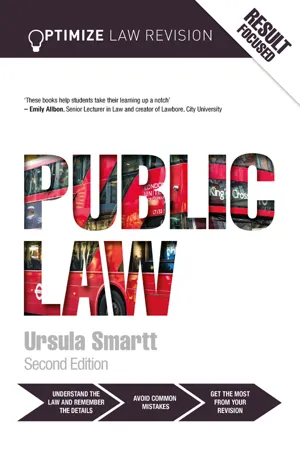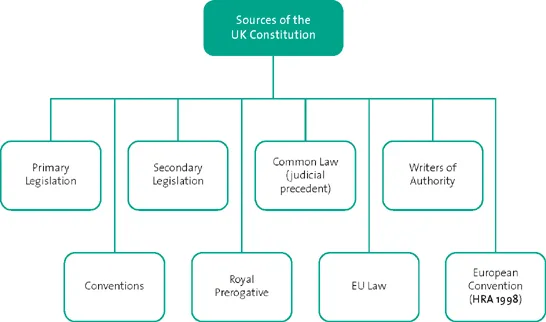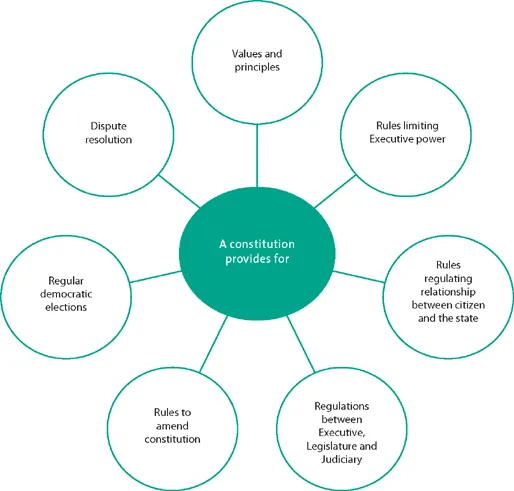
eBook - ePub
Optimize Public Law
Ursula Smartt
This is a test
Share book
- 258 pages
- English
- ePUB (mobile friendly)
- Available on iOS & Android
eBook - ePub
Optimize Public Law
Ursula Smartt
Book details
Book preview
Table of contents
Citations
About This Book
The Optimize series is designed to show you how to apply your knowledge in assessment. These concise revision guides cover the most commonly taught topics, and provide you with the tools to:
Understand the law and remember the details
-
- using diagrams and tables throughout to demonstrate how the law fits together
Contextualise your knowledge
-
- identifying and explaining how to apply legal principles for important cases
-
- providing cross-references and further reading to help you aim higher in essays and exams
Avoid common misunderstandings and errors
-
- identifying common pitfalls students encounter in class and in assessment
Reflect critically on the law
-
- identifying contentious areas that are up for debate and on which you will need to form an opinion
Apply what you have learned in assessment
-
- presenting learning objectives that reflect typical assessment criteria
-
- providing sample essay and exam questions, supported by end-of chapter feedback
The series is also supported by comprehensive online resources that allow you to track your progress during the run-up to exams.
Frequently asked questions
How do I cancel my subscription?
Can/how do I download books?
At the moment all of our mobile-responsive ePub books are available to download via the app. Most of our PDFs are also available to download and we're working on making the final remaining ones downloadable now. Learn more here.
What is the difference between the pricing plans?
Both plans give you full access to the library and all of Perlego’s features. The only differences are the price and subscription period: With the annual plan you’ll save around 30% compared to 12 months on the monthly plan.
What is Perlego?
We are an online textbook subscription service, where you can get access to an entire online library for less than the price of a single book per month. With over 1 million books across 1000+ topics, we’ve got you covered! Learn more here.
Do you support text-to-speech?
Look out for the read-aloud symbol on your next book to see if you can listen to it. The read-aloud tool reads text aloud for you, highlighting the text as it is being read. You can pause it, speed it up and slow it down. Learn more here.
Is Optimize Public Law an online PDF/ePUB?
Yes, you can access Optimize Public Law by Ursula Smartt in PDF and/or ePUB format, as well as other popular books in Law & Law Theory & Practice. We have over one million books available in our catalogue for you to explore.
1 An Introduction to Constitutional Law
Revision objectives
Understand the law | • Can you define what a constitution is? • Are you able to explain what is meant by a codified constitution? • Do you understand what is meant by the concept of constitutionalism? |
Remember the details | • Are you able to explain why countries need a constitution? • Can you name the sources that make up the unwritten UK Constitution? • Can you define different types of constitutions? |
Reflect critically on areas of debate | • Are you able to explain and discuss the historical foundations of the UK Constitution? • Can you discuss the set of rules and main categories that govern a constitution? |
Contextualise | • Can you relate this area of law to the fundamental constitutional law and its framework of the United Kingdom? • Are you able to describe ‘pure’ and ‘mixed’ constitutional theories? • Would you be able to define ‘rigid’ and ‘flexible’ constitutions? |
Apply your skills and knowledge | • Can you complete the example essays concerning the law of the constitution? • Are you able to debate the difference between codified and uncodified constitutions? • Would you be able to cite critical legal debate, citing writers of authority, such as Dicey, Wheare or Jennings? |
Chapter Map

Introduction: general principles
Public (constitutional) Law refers to the relationship between individuals and the state (i.e. Government). The UK syllabus in Public Law is made up of constitutional and administrative law (which can be taught in separate semesters or years), tax law and criminal law (not covered in this book). This area of law can be very theoretical and you will generally find essay questions set either as coursework or as part of the Public Law examination. Some institutions will teach this area of law as ‘Public Law 1’ dealing with constitutional law. Part 2 usually deals with administrative law, such as Judicial Review and Human Rights, which may involve problem questions. In this chapter, we look at constitutional law, which governs relationships between individuals and the Government, and those relationships between individuals, which are of direct concern to society. From the start you need to learn the meaning of ‘public authority’ by which is meant ‘Government’ or ‘the Executive’ in form of local government, local authorities, Ministers, the police, the prison and probation services (or ‘National Offender Management Service’ or ‘NOMS’), the National Health Service and so on. This will become important when we will look at administrative law and principles of Judicial Review. It is therefore necessary to look at the functions of the Executive – both central and local – which makes decisions about the rights of individuals and on behalf of individuals.
Aim Higher
Public Law, then, deals with the role and powers of the institutions within the state and with the relationship between the citizen and the state. Constitutional law deals with public rights, including welfare benefits, the Health Service, the way prisons and the police are run, how universities should function, and how Government spends money raised through taxes. You need to understand the theoretical basis for this subject in order to debate in class or be able to write a good legal essay on the topic. It is also important that you understand the current politics and political set up of the United Kingdom – and this includes Devolution, its relationship with the European Union (post Brexit) and how the Human Rights Act 1998 (HRA) influences all areas of Public Law. All are now parts of the UK Constitution. It is important that you have a clear understanding of the differences between public and private law.
Professor KC Wheare defines the constitution of a state as:
‘the whole system of government of a country, the collection of rules which establish and regulate or govern the government’.
(see: Wheare, K.C., 1966, Modern Constitutions)
What is a constitution?
A constitution is a set of rules that governs an organisation. Sir Ivor Jennings (1903–1965), one of the most prominent constitutional law scholars, described a constitution as a ‘document in which are set out the rules governing the composition, powers and methods of operation of the main institutions of Government, and the general principles applicable to their relations to the citizens’ (Sir Ivor Jennings, The British Constitution, 1959). Every organisation – be it a tennis club, student union or nation state – has defined objectives and specific offices within that organisation and therefore needs a constitution to define the rules, regulations and rights of its members. Framers and writers of a constitution will want to ensure that a constitution is not altered carelessly or at the whim of Government and that the document is not tampered with. There needs to be some special process of constitutional amendment, i.e. that the Legislature (Parliament) can only amend the constitution by a two-thirds majority or after a General Election, for example.

Why do countries have a constitution?
Why is it important for most democratic states that their constitution is superior to the ordinary law? Plato (bc 348) described constitutionalism in his The Laws as follows: ‘some body of law should exist on a permanent basis, on a superior plane – neither subject to individual tyranny, nor to a raw majority democracy’. Kenneth Clinton Wheare, in his Modern Constitutions (1966), investigated the origins of modern constitutions and found that they were drawn up and adopted because people wished to make a fresh start with a new system of Government. In the case of the United States, because some neighbouring communities wished to unite together under a new Government; or because, as in Austria or Hungary or Czechoslovakia after 1918, communities had been released from an empire as the result of a war and were now free to govern themselves; or because, as in France in 1789 or the USSR in 1917, a revolution had made a break with the past and a new form of Government on new principles was desired; or because, as in Germany after 1918 and in 1945, defeat in war had broken the continuity of Government and a fresh start was required after the war.
The American Constitution (1781) is often cited as that which has led many other countries to think it necessary to have a constitution. The reason why most countries think it necessary to give the constitution a higher status in law than other rules of law is because they think of it as an instrument by which the Government can be controlled. Wheare believed that constitutions are able to limit the powers of Government. Most importantly, a constitution can limit the Executive or sub-ordinate local bodies (i.e. local authorities). At times, it can limit the Legislature, but only so far as the amendment of the constitution is concerned. In summary, in a truly democratic state, a country’s constitution will be supreme over a Government.
Types of constitutions
Do we mean a written document when we think of constitutions? In which case the United Kingdom has no constitution. It is therefore best to talk about ‘codified’ and ‘uncodified’ constitutions. Great Britain therefore has an uncodified constitution. Most European countries have a codified constitution such as the German Grundgesetz, the Basic Constitution of 19...